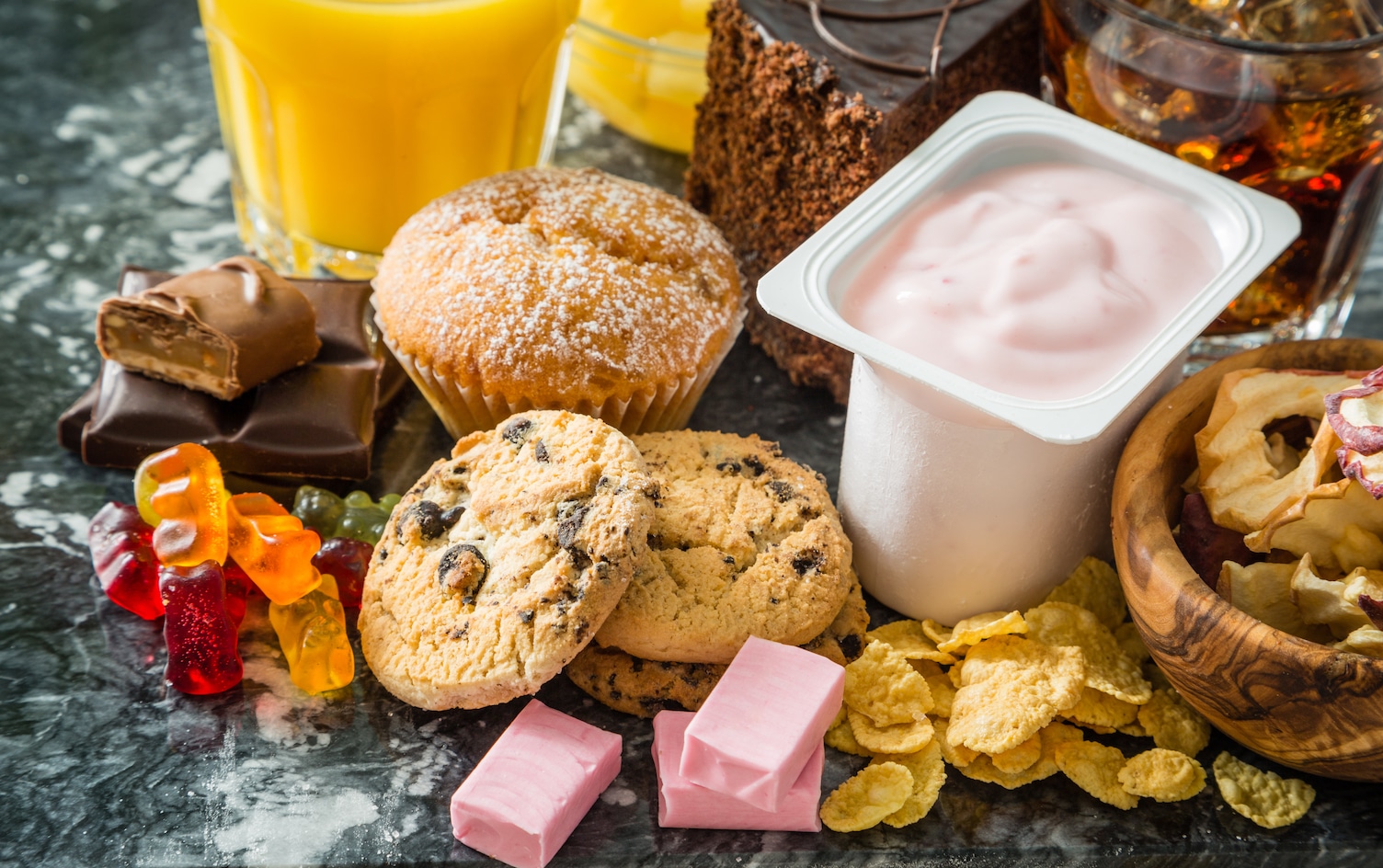Read the nutrition label of almost any packaged food and you’ll likely have a hard time pronouncing a lot of the ingredients, let alone have any idea what they actually are. While some could be perfectly fine (cyanocobalamin is Vitamin B12, who knew?), others aren’t so much. Turns out there may be a lot of potentially harmful chemicals lurking in that bag of candy you just snagged at the checkout aisle—and Illinois is seeking to put an end to that with a new bill.
The Illinois Food Safety Act would ban five food additives commonly found in processed foods, many of which are already banned in other countries around the world. According to supporters, the goal of the proposed legislation is to encourage manufacturers to swap out dangerous chemicals for healthier alternatives.
We spoke with Stephanie Tarnacki, RD, to learn more about the ingredients under review, and whether or not you should avoid them in the grocery store, regardless of whether or not the bill passes.
5 Food Additives: A Dietitian’s Take
1. BROMINATED VEGETABLE OIL
1. BROMINATED VEGETABLE OIL
Brominated vegetable oil is a blend of bromine and vegetable oil that prevents beverages from separating by thickening the flavoring syrups and oils.
Commonly found in:
Citrus-flavored sodas, sports drinks, and energy drinks
Should it be avoided?
Yes, a void drinks with added brominated vegetable oils or just stick to seltzer or water.
“Many studies have shown that bromine consumption can lead to accumulation in certain tissues, like your thyroid,” Tarnacki explains. “This can potentially lead to issues with hormone regulation, and growth and development.”
Currently banned in Europe and Japan, the chemical was actually removed from the FDA’s “generally regarded as safe” list in the late 1960s. Because not enough evidence existed to restrict use all together, it was and is still allowed in fruit-flavored beverages to this day. That may be changing soon, though.
Also Read >> Drinks That Are Worth the Calories (or Not)
2. POTASSIUM BROMATE
2. POTASSIUM BROMATE
Bakers use potassium bromate, which is a chemical additive, to strengthen dough and thus improve the texture of bread and other baked food products.
Commonly found in:
Bread and baked goods
Should it be avoided?
Yes, Tarnacki says. “One study indicated the oxidative stress associated with potassium bromate caused DNA breakage which led to altered platelet and white blood cell counts, increased LDL and liver toxicity,” she explains, adding that another study found the chemical to be carcinogenic in rats. (Something that is found carcinogenic means it has the potential to cause cancer.) It’s currently banned in several countries, including the European Union, Brazil, Canada, and the UK.
Also Read >> 3 Healthier Bread to Try
PROPYLPARABEN
PROPYLPARABEN
A type of paraben, propylparaben is an artificial substance that acts as a preservative by inhibiting the growth of microorganisms. This keeps food fresher for longer.
Commonly found in:
Processed foods, baked goods, and some drinks
Should it be avoided?
Yes. “The family of parabens—propylparaben included—are known endocrine disrupting chemicals (EDCs),” Tarnacki says. These EDCs can mess with your hormones, which can lead to reproductive, developmental and neurological disorders, and potentially some types of cancers. They can also have a negative impact on fertility. A.k.a. avoid consuming foods with propylparaben where possible.
RED DYE NO. 3
RED DYE NO. 3
This synthetic dye—which is different from red dye 40—is made from petroleum to give food, medicine, and beverages a red color.
Commonly found in:
Candy, fruit snacks, and other processed foods
Should it be avoided?
Yes, wherever possible. Not only has it been shown to be carcinogenic in lab animals, studies have linked the consumption of this chemical to an increased risk of breast cancer and thyroid cancer, along with adverse behavioral outcomes in children. Plus, it’s mostly found in foods with little nutritional value, Tarnacki says. “It’s a good option to nix those foods from your diet regardless of knowing this is a carcinogen.”
TITANIUM DIOXIDE
TITANIUM DIOXIDE
Titanium dioxide is actually a natural chemical that’s added to food (and even sunscreen) to create more of an opaque white hue.
Commonly found in:
Candy, cake frosting, and powdered foods
Should it be avoided?
“Seemingly yes, because it’s possibly carcinogenic to humans. But I’m not sure I’d bend over backwards to avoid it,” Tarnacki says, explaining that more research is needed.
If the bill passes, it won’t go into effect until January 2, 2027. That said, even if it doesn’t pass, reducing your intake of processed food—and thus potentially harmful additives—is always a good idea for your overall health.
Ready to take your health into your own hands? Download the MyFitnessPal app (for free!).




